|
|
|
Sort Order |
|
|
|
Items / Page
|
|
|
|
|
|
|
| Srl | Item |
| 1 |
ID:
183181
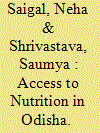

|
|
|
|
|
| Summary/Abstract |
Celebrated as a nutrition champion, Odisha state in India has achieved significant improvements in nutrition of its women and children. The overall progress, however, masks familiar inequities, evidenced in significantly higher levels of stunting, wasting and underweight in children. The article examines access, a key underlying determinant of undernutrition, to two nutrition government schemes of Odisha—the Supplementary Nutrition Programme and Mamata—for the most vulnerable groups in the state’s Angul district. The study identifies limited awareness and lack of proactive disclosure of scheme information, excessive distance from centres that provide the schemes, caste-based power dynamics and weak monitoring institutions as key factors restricting access of specific social groups to these two schemes. The article examines the factors constraining access and considers potential solutions to overcome these bottlenecks in order to provide more effective protection mechanisms.
|
|
|
|
|
|
|
|
|
|
|
|
|
|
|
|
| 2 |
ID:
125907
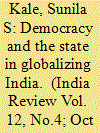

|
|
|
|
|
| Publication |
2013.
|
| Summary/Abstract |
How are the contours and practices of the state changing under the regime of economicliberalization in India? To address these questions in the context of India, in this essay I turn to the relatively understudied state of Odisha. The most common sites of research about the political economy of globalization in India are the technology clusters around Delhi, Bangalore, and Chennai, and the dynamic spaces of the burgeoning service sector. By analyzing politics in globalizing Odisha, however, we get a different sense of the messy, complicated, and sometimes contradictory politics of globalization in India, as well as how the state is adapting to these changes. The relative success of Odisha in attracting investments in mining and mining-related sectors is due both to the opening of the Indian market generally as well as efforts by the state government to promote industrial investment in these sectors.
|
|
|
|
|
|
|
|
|
|
|
|
|
|
|
|
| 3 |
ID:
193033


|
|
|
|
|
| Summary/Abstract |
Given the global commitment to zero hunger and in the backdrop of Asian enigma, this paper looks into nutritional deprivation among Kandhas, a tribal community from Odisha, India. Based on fieldwork during a harvest period, the pervasive household-specific and nutrient-specific deprivation is intriguing. An inverse relationship between the number of nutrient deficiencies and the number of food groups consumed is observed. Food intake among pregnant and lactating mothers at homes is lower than that at Maa Gruha, a care facility. The fieldwork coincides with the initial days of a millets intervention and could serve as a baseline for future comparison.
|
|
|
|
|
|
|
|
|
|
|
|
|
|
|
|
| 4 |
ID:
156526
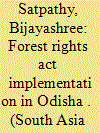

|
|
|
|
|
| Summary/Abstract |
The Forest Rights Act (FRA) 2006 claims to devolve ownership to local forest dwellers in India, to provide local communities with better tenurial security and allow increased rights over forest resources. One argument for this is the redressal of historical injustices, particularly to tribal people. Offering a reality check, this article scrutinises the interface of informal and formal institutions with respect to livelihood of forest-dependent communities and forest conservation to identify ongoing implementation challenges. Empirical data from two villages of Mayurbhanj district in Odisha use oral history, focus group discussions and in-depth interviews with different actors in FRA implementation as evidence. Asymmetric information flow, deficient coordination, undemocratic participation, dearth of transparency and lack of accountability at various levels hinder FRA implementation, which claims to safeguard the basic rights of disempowered local people, but does not appear to deliver ‘complete justice’.
|
|
|
|
|
|
|
|
|
|
|
|
|
|
|
|
| 5 |
ID:
150797
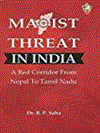

|
|
|
|
|
| Publication |
New Delhi, Pentagon Press, 2017.
|
| Description |
xxiv, 431p.hbk
|
| Standard Number |
9788182749207
|
|
|
|
|
|
|
|
|
|
|
|
Copies: C:1/I:0,R:0,Q:0
Circulation
| Accession# | Call# | Current Location | Status | Policy | Location |
| 058938 | 322.420954/SAH 058938 | Main | On Shelf | General | |
|
|
|
|
| 6 |
ID:
161943


|
|
|
| 7 |
ID:
139630
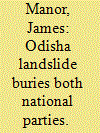

|
|
|
|
|
| Summary/Abstract |
In May 2014, a regional party in Odisha, the Biju Janata Dal, defied national trends by thrashing the Bharatiya Janata Party (BJP) and the Congress Party at both parliamentary and state elections. It offered voters a high-profile regional leader who had radically centralised power and retained the capacity to govern somewhat effectively, even forcefully. It thus countered the appeal of BJP leader Narendra Modi to offer those same things. This analysis examines how this state government – like a few others – was able to withstand the national swing towards the BJP and Modi.
|
|
|
|
|
|
|
|
|
|
|
|
|
|
|
|
| 8 |
ID:
124285


|
|
|
|
|
| Publication |
2013.
|
| Summary/Abstract |
Port played an important role in the maritime history of ancient Odisha as elsewhere. The long coastline of Odisha was studded with several excellent ports and anchorages during the anceint period. Since ports of anchorage were a pre - requisite for overseas trade and commerce many ports natuarlly grew up at strategic points.
|
|
|
|
|
|
|
|
|
|
|
|
|
|
|
|
| 9 |
ID:
123279


|
|
|
|
|
| Publication |
2013.
|
| Summary/Abstract |
This paper has studied electricity pricing under a regulated structure during post power sector reform in Odisha, India. It is found that Odisha has adopted the average cost pricing principle for determining electricity price with the rate of return regulation. This process of tariff determination not only takes a long time but also involves huge cost. Further, actual tariffs levied by the Odisha Electricity Regulatory Commission (OERC) are at variance with the broad principles of rational pricing policy. This uneconomic pricing policy has adverse impact on the financial health of the distribution companies. However, the Electricity Act of 2003 has brought about a radical change in the power scenario across the country, including the state of Odisha, by introducing open access and trading of power.
|
|
|
|
|
|
|
|
|
|
|
|
|
|
|
|
| 10 |
ID:
180677


|
|
|
|
|
| Summary/Abstract |
This study seeks to counter interpretations of tribal movements as reflecting parochial and perverse ethno-territorial aspirations, mostly in irrational violent forms. It compares two peaceful protest movements against wildlife sanctuaries located in different geographical and political-economic settings in the eastern Indian state of Odisha. As rational collective actions, both movements relied on the agency of project-affected persons who questioned state attempts to de-politicise development in the name of scientific conservation. The study shows how the legitimate concerns of such project-affected citizens were overshadowed by politics and the context-specific dialectical interface between three different factors, namely availability of indigenous organisational resources, political opportunity structures and identity construction.
|
|
|
|
|
|
|
|
|
|
|
|
|
|
|
|
| 11 |
ID:
160023


|
|
|
|
|
| Summary/Abstract |
Prevalence of stunting among India’s tribal under-five children has witnessed a 3% annual decline in the last 8 years. Cross-sectional data of 1000 children (287 tribal and 713 non-tribal) aged 0–23 months from Odisha’s Rapid Survey of Children (RSOC, 2014) was analysed to identify the predictors of stunting and severe stunting among tribal children and to suggest policy and programme implications. Results show significant determinants of childhood stunting to be birth order, maternal illiteracy and determinants for severe stunting were maternal age <18 years at marriage and <20 years at birth, and <3 antenatal clinic visits. Severe stunting in tribal children was predicted by basic causes: poverty and maternal age <20 years at first birth and age <18 years at marriage. Findings strongly suggest to accelerate efforts towards reducing childhood stunting in Odisha more specifically among tribal children for whom a special strategy is urgently warranted.
|
|
|
|
|
|
|
|
|
|
|
|
|
|
|
|
| 12 |
ID:
170674
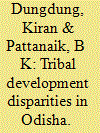

|
|
|
|
|
| Summary/Abstract |
The well-known phenomenon of tribal disadvantage in India requires constant monitoring to ensure diligent attention to equitable protection of tribal people’s right to life. This article, based on an analysis of primary data collected from 400 households in eight different tribal communities in Odisha, charts the differential progress of Odisha tribals by establishing a Tribal Development Index. Such data identify significant development disparities and confirm the existence of a ‘creamy layer’, constituted of more developed individuals and families also among India’s tribals. While many households in these eight communities still lack basic amenities, notable differences regarding food security, landholding, income and overall development were identified, supporting arguments for devising more sophisticated differential forms of intervention.
|
|
|
|
|
|
|
|
|
|
|
|
|
|
|
|
|
|
|
|
|